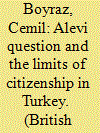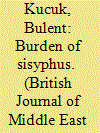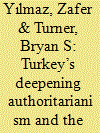|
|
|
Sort Order |
|
|
|
Items / Page
|
|
|
|
|
|
|
| Srl | Item |
| 1 |
ID:
169338


|
|
|
|
|
| Summary/Abstract |
The Alevi question in Turkey is not only about a manifestation of the demands for religious freedoms and pluralism but also an issue of citizenship at least for the last three decades. This article argues that as a result of the rise of the Alevi identity and collective capacity of the Alevis to formulate demands in the national and international public spheres, the issue has increasingly turned to a matter of struggle for the long-denied equal citizenship rights of the Alevis in Turkey. Expected failure of workshops process, namely Alevi Opening, during the second term of the Adalet ve Kalkınma Partisi (AKP) period increasingly brought a sense of the disappointment among the Alevi organizations due to the fact that the issue was not managed with a perspective based on equal citizenship rights but with a discussion on the authenticity and originality of the Alevi demands. Enduring silence for the solution of the Alevi question in the last decade would lead Alevi organizations to the search for the extension of the self-creation of the survival mechanisms without the state support. This paper, within these considerations, is based on the demands of the Alevi society in Turkey and their struggle for the legal recognition, which increasingly challenged the Turkish form of secularism and citizenship regimes today.
|
|
|
|
|
|
|
|
|
|
|
|
|
|
|
|
| 2 |
ID:
169333


|
|
|
|
|
| Summary/Abstract |
ABSTRACT
This paper examines the contradictory transformation process the Kurdish movement has been experiencing over the last two decades and discusses its structural paradoxes and political shortcomings from a critical sociological perspective. Based on participant observation and interviews with activist researchers, the paper argues that the moral and ideological unity of the movement is challenged by ever-increasing social and mental divisions that are in turn prompted by forced displacement, rapid urbanization and diversified forms of social and symbolic inequalities within the Kurdish society. The fundamental division is between the emerging educated middle-class subjectivity, which has become the prime intellectual force leading the democratic political institutions, and the socially impoverished and radicalized urban youth, who have been active in contentious politics. This social division manifests within the dual organizational structures of the movement as twin and frequently contradictory dispositions. This schism also prevents the movement from building a much broader popular subjectivity to decolonize the social and political life.
|
|
|
|
|
|
|
|
|
|
|
|
|
|
|
|
| 3 |
ID:
169341


|
|
|
|
|
| Summary/Abstract |
This article explores the motivations behind the applications for Portuguese citizenship by Turkish Jews since 2015. Based on a qualitative research, the findings highlight that obtaining a second passport does not yet equate emigration. Rather, it constitutes an insurance policy aimed at alleviating growing ontological insecurity, stemming partly from their secular and westernized lifestyle and from their Jewish identity, which are endangered by perceived de-secularisation, growing anti-Semitism and authoritarian trends in Turkey.
|
|
|
|
|
|
|
|
|
|
|
|
|
|
|
|
| 4 |
ID:
169326


|
|
|
|
|
| Summary/Abstract |
Since the Turkish government’s recent turn to authoritarianism, tens of thousands of public dissidents and government critics have been subjected to dismissals and revocation of civic rights via emergency decrees. The victims call this process ‘civil death’. We aim to understand the logic behind this form of punishment in Turkey by examining the differential genealogy of civil death in the work of Hannah Arendt, Bertrand Ogilvie, Giorgio Agamben, and Achille Mbembe. We demonstrate that a later form of civil death was used by totalitarian regimes in a process leading to the reduction of targeted individuals as ‘superfluous’ and as ‘living corpses’ in concentration camps. In these contexts, death became an instrument of biopolitical and necropolitical powers. We propose that although contemporary punishment of public dissidents in Turkey shares some similarities with these forms of civil death, it may more fittingly be identified as civic death. We argue that while civil death is based on the classical political right of the sovereign to ‘make die’ after first reducing targeted individuals to little more than living corpses, civic death is linked to the power of the sovereign to ‘let die’ through the exclusion of public dissidents from economic, social, and political life.
|
|
|
|
|
|
|
|
|
|
|
|
|
|
|
|
| 5 |
ID:
169327


|
|
|
|
|
| Summary/Abstract |
Almost half of the political life has been experienced under the state of emergency and state of siege policies in the Turkish Republic. In spite of such a striking number and continuity in the deployment of legal emergency powers, there are just a few legal and political studies examining the reasons for such permanency in governing practices. To fill this gap, this paper aims to discuss one of the most important sources of the ‘permanent’ political crisis in the country: the historical evolution of legal emergency power. In order to highlight how these policies have intensified the highly fragile citizenship regime by weakening the separation of power, repressing the use of political rights and increasing the discretionary power of both the executive and judiciary authorities, the paper sheds light on the emergence and production of a specific form of legality based on the idea of emergency and the principle of executive prerogative. In that context, it aims to provide a genealogical explanation of the evolution of the exceptional form of the nation-state, which is based on the way political society, representation, and legitimacy have been instituted and accompanying failure of the ruling classes in building hegemony in the country.
|
|
|
|
|
|
|
|
|
|
|
|
|
|
|
|
| 6 |
ID:
169330


|
|
|
|
|
| Summary/Abstract |
Based on a continuous and relational understanding of state-formation, as conceptualized by Charles Tilly, and inspired by Gramsci’s formulation of ‘war of position’, AKP regime in Turkey can be identified as a process of (re)-entrenchment. The AKP’s original claim to de-securitize the state–society relationship in Turkey has re-entrenched, re-aligned and re-institutionalized positions of power and democratic participation within the state to overcome the old-guard and establish its own hegemonic rule. The conspicuous disappearance of a booklet from 2013, i.e. the Silent Revolution, that was supposed to be the historical documentation of the AKP’s ambitious original claims from all AKP-related media effectively indicates its abandonment of these goals. This document reveals the contentious (re)entrenchments while the party ascended to power challenging deep-rooted security-oriented positions of the statist nationalism. This ascent to power was indeed a ‘war of position’ during which international opportunities created by the EU were effectively navigated and legislation and executive actions a) pertaining rule of law, human rights and freedoms, administrative accountability and transparency, b) economic and social reforms regarding vulnerable social groups, anti-corruption measures and labour relations, c) de-securitization and civilianization of government agencies and d) issues of Kurdish citizens were utilized as ‘trenches.’
|
|
|
|
|
|
|
|
|
|
|
|
|
|
|
|
| 7 |
ID:
169344


|
|
|
|
|
| Summary/Abstract |
In spring 2015, Turkey witnessed the unexpected rise of the HDP, founded by the Kurdish Liberation Movement together with the Turkish radical left, against President Erdoğan’s authoritarian rule. In this article, I will employ contemporary literature on left populism to explain the HDP’s rise as an alternative left hegemonic project against the neoliberal authoritarianism that Erdoğan represents. After discussing the historical context from which the HDP emerged and grew, I will evaluate its discourse and strategies based on a conceptualization of left-wing populism. Lastly, I will discuss the challenges that the HDP confronted after the June 2015 elections and the differences between the Turkish and Western European contexts for a left-wing populist strategy.
|
|
|
|
|
|
|
|
|
|
|
|
|
|
|
|
| 8 |
ID:
169325


|
|
|
|
|
|
|
|